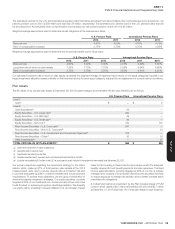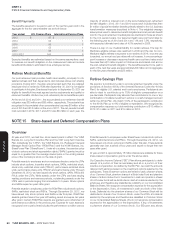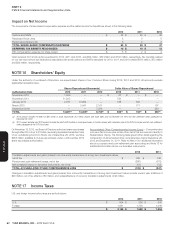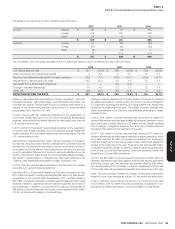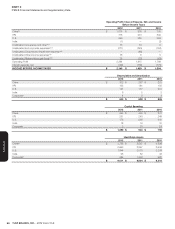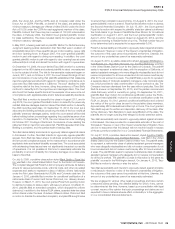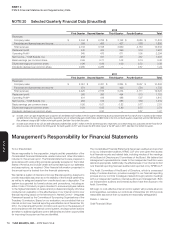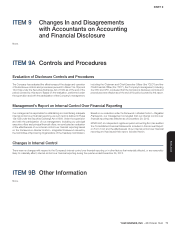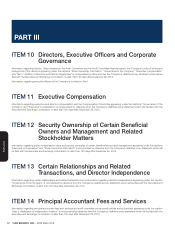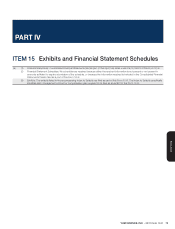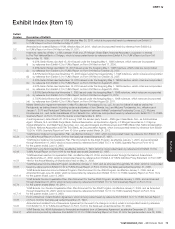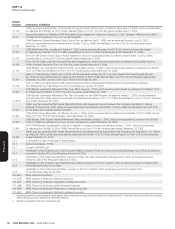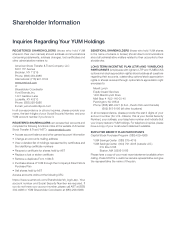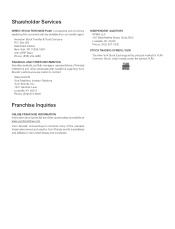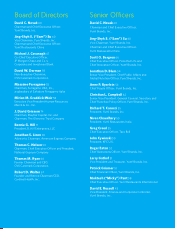Pizza Hut 2012 Annual Report Download - page 161
Download and view the complete annual report
Please find page 161 of the 2012 Pizza Hut annual report below. You can navigate through the pages in the report by either clicking on the pages listed below, or by using the keyword search tool below to find specific information within the annual report.
YUM! BRANDS, INC.-2012 Form10-K 69
Form 10-K
PART II
ITEM 8Financial Statements andSupplementaryData
ADA, the Unruh Act, and the CDPA; and (c) monetary relief under the
Unruh Act or CDPA. Plaintiffs, on behalf of the class, are seeking the
minimum statutory damages per offense of either $4,000 under the Unruh
Act or $1,000 under the CDPA for each aggrieved member of the class.
Plaintiffs contend that there may be in excess of 100,000 individuals in
the class. In February2004, the District Court granted plaintiffs’ motion
for class certifi cation. The class included claims for injunctive relief and
minimum statutory damages.
In May2007, a hearing was held on plaintiffs’ Motion for Partial Summary
Judgment seeking judicial declaration that Taco Bell was in violation of
accessibility laws as to three specifi c issues: indoor seating, queue rails
and door opening force. In August2007, the court granted plaintiffs’
motion in part with regard to dining room seating. In addition, the court
granted plaintiffs’ motion in part with regard to door opening force at some
restaurants (but not all) and denied the motion with regard to queue lines.
On December16, 2009, the court denied Taco Bell’s motion for summary
judgment on the ADA claims and ordered plaintiffs to select one restaurant
to be the subject of a trial. The trial for the exemplar restaurant began on
June6, 2011, and on October5, 2011 the court issued Findings of Fact
and Conclusions of Law ruling that plaintiffs established that classwide
injunctive relief was warranted with regard to maintaining compliance as to
corporate Taco Bell restaurants in California. The court declined to order
injunctive relief at the time, however, citing the pendency of Taco Bell’s
motions to decertify both the injunctive and damages class. The court
also found that twelve specifi c items at the exemplar store were once out
of compliance with applicable state and/or federal accessibility standards.
Taco Bell fi led a motion to decertify the class in August2011, and in
July2012, the court granted Taco Bell’s motion to decertify the previously
certifi ed state law damages class but denied Taco Bell’s motion to decertify
the ADA injunctive relief class. On September13, 2012, the court set a
discovery and briefi ng schedule concerning the trials of the four individual
plaintiffs’ state law damages claims, which the court stated will be tried
before holding further proceedings regarding the possible issuance of an
injunction. On September17, 2012, the court issued an order modifying
its October2011 Findings of Facts and Conclusions of Law deleting the
statement that an injunction was warranted. Plaintiffs appealed that order.
Briefi ng is complete, and the parties await a hearing date.
Taco Bell denies liability and intends to vigorously defend against all claims
in this lawsuit. Further, Taco Bell intends to vigorously oppose plaintiffs’
appeal. Taco Bell has taken steps to address potential architectural
and structural compliance issues at the restaurants in accordance with
applicable state and federal disability access laws. The costs associated
with addressing these issues have not signifi cantly impacted our results
of operations. It is not possible at this time to reasonably estimate the
probability or amount of liability for monetary damages on a class wide
basis to Taco Bell.
On July9, 2009, a putative class action styled Mark Smith v. Pizza Hut,
Inc. was fi led in the United States District Court for the District of Colorado.
The complaint alleged that Pizza Hut did not properly reimburse its delivery
drivers for various automobile costs, uniforms costs, and other job-related
expenses and seeks to represent a class of delivery drivers nationwide
under the Fair Labor Standards Act (FLSA) and Colorado state law. On
January4, 2010, plaintiffs fi led a motion for conditional certifi cation of a
nationwide class of current and former Pizza Hut, Inc. delivery drivers.
However, on March11, 2010, the court granted Pizza Hut’s pending motion
to dismiss for failure to state a claim, with leave to amend. On March31,
2010, plaintiffs fi led an amended complaint, which dropped the uniform
claims but, in addition to the federal FLSA claims, asserted state-law class
action claims under the laws of sixteen different states. Pizza Hut fi led
a motion to dismiss the amended complaint, and plaintiffs sought leave
to amend their complaint a second time. On August9, 2010, the court
granted plaintiffs’ motion to amend. Pizza Hut fi led another motion to dismiss
the Second Amended Complaint. On July15, 2011, the Court granted
Pizza Hut’s motion with respect to plaintiffs’ state law claims but allowed
the FLSA claims to go forward. Plaintiffs fi led their Motion for Conditional
Certifi cation on August31, 2011, and the Court granted plaintiffs’ motion
April21, 2012. The opt-in period closed on August23, 2012, and the
parties are working to fi nalize the list of opt-ins. The fi nal number has yet
to be determined but is expected to be approximately 6,000.
Pizza Hut denies liability and intends to vigorously defend against all claims
in this lawsuit. However, in view of the inherent uncertainties of litigation,
the outcome of this case cannot be predicted at this time. Likewise, the
amount of any potential loss cannot be reasonably estimated.
On August6, 2010, a putative class action styled Jacquelyn Whittington v.
Yum Brands, Inc., Taco Bell of America, Inc. and Taco Bell Corp. was fi led
in the United States District Court for the District of Colorado. The plaintiff
seeks to represent a nationwide class, with the exception of California, of
salaried assistant managers who were allegedly misclassifi ed and did not
receive compensation for all hours worked and did not receive overtime pay
after 40 hours worked in a week. The plaintiff also purports to represent
a separate class of Colorado assistant managers under Colorado state
law, which provides for daily overtime after 12 hours worked in a day. The
Company has been dismissed from the case without prejudice. Taco Bell
fi led its answer on September20, 2010, and the parties commenced
class discovery, which is currently on-going. On September16, 2011,
plaintiffs fi led their motion for conditional certifi cation under the FLSA.
The court heard plaintiffs’ motion for conditional certifi cation under the
FLSA on January10, 2012, granted conditional certifi cation and ordered
the notice of the opt-in class be sent to the putative class members.
Approximately 488 individuals submitted opt-in forms. The court granted
Taco Bell’s request for written and deposition discovery of the class. After
further discovery, Taco Bell plans to seek decertifi cation of the class. The
plaintiffs are no longer pursuing their alleged Colorado state law claims.
Taco Bell denies liability and intends to vigorously defend against all claims
in this lawsuit. We have provided for a reasonable estimate of the cost of
this lawsuit. However, in view of the inherent uncertainties of litigation, there
can be no assurance that this lawsuit will not result in losses in excess
of those currently provided for in our Consolidated Financial Statements.
On July27, 2012, a putative class action lawsuit, styled Agustine Castillo
v. Taco Bell of America, LLC and Taco Bell Corp., was fi led in the United
States District Court for the Eastern District of New York. The plaintiff seeks
to represent a nationwide class of salaried assistant general managers
who were allegedly misclassifi ed and did not receive compensation for all
hours worked and did not receive overtime pay after 40 hours worked in
a week. The plaintiff also seeks to represent a statewide class of salaried
assistant general managers who allegedly did not receive compensation
for all hours worked. The plaintiff’s counsel in this action is the same as
plaintiffs’ counsel in the Whittington lawsuit. On January4, 2013, Taco
Bell fi led a motion to dismiss or stay the action.
Taco Bell denies liability and intends to vigorously defend against all claims
in this lawsuit. However, in view of the inherent uncertainties of litigation,
the outcome of this case cannot be predicted at this time. Likewise, the
amount of any potential loss cannot be reasonably estimated.
We are engaged in various other legal proceedings and have certain
unresolved claims pending, the ultimate liability for which, if any, cannot
be determined at this time. However, based upon consultation with legal
counsel, we are of the opinion that such proceedings and claims are not
expected to have a material adverse effect, individually or in the aggregate,
on our consolidated fi nancial statements.


